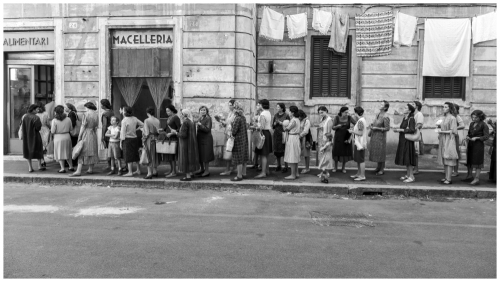There’s Still Tomorrow

This is a brilliant directorial debut of Italian actress, Paola Cortellesi. Sharp, elegant and passionate, she tells a story of the past with great love and great joy.
Set in Rome just after the second world war, the Americans are patrolling the roads giving chocolate to the locals. Some people have become richer with the black market, others more honest are struggling to maintain their families, like Dea, who is a devoted mother and wife. She lives in a basement with her three children and husband. She works all day at home and beyond, repairing brass and umbrellas for local shops, and acting as a sort of nurse, doing intramucosal injections, in exchange for a little money which she hands over to her husband at the end of the day, while keeping some back to buy a wedding dress for her daughter. The days may be hard for Dea – but not as hard as the evening, when her husband, an ex-soldier suffering for post-traumatic stress, regularly beats her up. Dea quietly accepts the violence with a smile.
This well-plaited, bittersweet drama is a nostalgic look at the past, with solidarity among women, social life in the courtyards, kids playing freely, and men meeting in the local bar. It is a warm look at the working class, and a critical one at the wealthy.
Shot in a magnificent black and white, it is also a movie of great style, an homage to the Italian postwar cinema, imbued with a renewal of style, especially in the choreography of the violence sequences. The original style of narration moves from a social realist observation of the daily life of the community to the reality of working-class family life.
The script remains unpredictable from the first moment to the end. It takes fascinating turns, hinting at a romantic direction, then a dramatic one. Its tone moves from dark to comic and then dark again, reminiscent of the tradition of great Italian directors of the “commedia all’italiana” (the Italian comedy), such as Mario Monicelli. This is the first true Italian ‘comedy with meaning’ that we have seen for long time.

Rita Di Santo
Rita di Santo is a film critic and reviewer.
Latest from Rita Di Santo
- An anti-war movie of compassion and kindness: a review of 'The Invasion' by Sergei Loznitsa
- My Favourite Cake
- Small Things Like These
- 'My movies are about class inequality': Rita Di Santo interviews Alejandra Márquez Abella
- Breaking the glass ceiling: Interview with Haifaa Al-Mansour, the first female Saudi director
